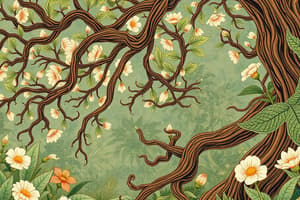Podcast
Questions and Answers
What is the relationship between bees and flowers called?
What is the relationship between bees and flowers called?
Mutualism
What type of ecosystem is characterized by extreme aridity and low rainfall?
What type of ecosystem is characterized by extreme aridity and low rainfall?
Desert Ecosystem
Why are ecosystems essential for the survival of all life on Earth?
Why are ecosystems essential for the survival of all life on Earth?
They provide habitat, maintain the climate, regulate the water cycle, and offer ecosystem services such as pollination and water purification.
Flashcards are hidden until you start studying
Study Notes
The Fascinating World of Ecosystems: An In-Depth Guide
Ecosystems are complex networks of interactions between organisms and their physical environment. They are dynamic, ever-changing systems that are fundamental to the functioning of Earth's biosphere. In this article, we will explore the concept of ecosystems, their ecological relationships, and the various types of ecosystems found on our planet.
What are Ecosystems?
An ecosystem is a community of living organisms interacting with each other and their non-living environment. This environment includes elements such as air, water, and soil, which provide the necessary resources for life. Ecosystems can be as small as a puddle or as large as an ocean, and they can exist in various forms, such as forests, deserts, grasslands, and more.
Ecological Relationships
Ecological relationships refer to the interactions between different species within an ecosystem. These relationships can be divided into four main categories:
-
Competition: This occurs when two or more species have the same basic needs and resources, leading to the two species fighting for the same resources.
-
Predation: In this relationship, one species (the predator) hunts and kills another species (the prey) for food.
-
Mutualism: This is a symbiotic relationship in which both species benefit from the interaction. For example, bees visit flowers to collect nectar, which helps the bees get food, and in turn, the bees help pollinate the flowers.
-
Parasitism: In this relationship, one species (the parasite) lives off another species (the host) without providing any benefits to the host. The parasite often harms the host, which may ultimately lead to its death.
Types of Ecosystems
There are several types of ecosystems, each with its unique characteristics and ecological relationships. Some of the most common types include:
-
Forest Ecosystem: Found in various regions, these ecosystems are characterized by the presence of trees and forest vegetation. They provide habitat for a wide variety of species and play a crucial role in maintaining the Earth's climate.
-
Desert Ecosystem: These ecosystems are characterized by extreme aridity and low rainfall. Desert species have adaptations to survive in these harsh conditions, such as succulent plants and animals that can store water.
-
Grassland Ecosystem: These ecosystems are characterized by vast expanses of grass and other herbaceous vegetation. They support a diverse range of species and play a crucial role in maintaining the Earth's climate.
-
Aquatic Ecosystem: These ecosystems include both freshwater and marine environments. They support a wide variety of species and play a crucial role in maintaining the Earth's climate and water cycle.
-
Tundra Ecosystem: Found in cold regions near the Earth's poles, these ecosystems are characterized by low temperatures and minimal vegetation. They support a limited number of species that are adapted to the harsh conditions.
The Importance of Ecosystems
Ecosystems are essential for the survival of all life on Earth. They provide habitat for a wide variety of species, maintain the Earth's climate, and help regulate the water cycle. In addition, ecosystems also provide a range of ecosystem services, such as pollination, water purification, and soil production.
Conclusion
Ecosystems are fascinating and complex networks of interactions between organisms and their physical environment. Understanding the ecological relationships within ecosystems and the various types of ecosystems found on Earth is crucial for the conservation of these vital systems. By working together to protect and maintain healthy ecosystems, we can ensure the long-term survival of all life on Earth.
Studying That Suits You
Use AI to generate personalized quizzes and flashcards to suit your learning preferences.




